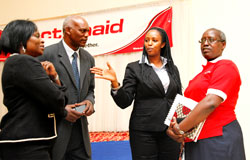Rwanda has been ranked third from the top among 28 countries declared the most prepared to confront the challenges of climate change, resource scarcity and rising food prices.The three issues have been a major challenge in the developing world. The survey Hunger FREE Scorecard was conducted by international NGO, Action Aid, and was launched at a function in Kigali on Wednesday. Among the countries surveyed, Rwanda was beaten to the top spots by Brazil and Malawi respectively.


Rwanda has been ranked third from the top among 28 countries declared the most prepared to confront the challenges of climate change, resource scarcity and rising food prices.The three issues have been a major challenge in the developing world.
The survey Hunger FREE Scorecard was conducted by international NGO, Action Aid, and was launched at a function in Kigali on Wednesday. Among the countries surveyed, Rwanda was beaten to the top spots by Brazil and Malawi respectively.
The 2011 survey lists countries that are most dedicated to addressing the three global challenges that impact on food security.
But it also points out that the country also needs to improve its vulnerability as threat of increasing food prices is high and it could easily erode the benefits achieved. It places Rwanda at Number 10 among the countries that could easily lose the advantage and could be vulnerable to food shortage.
The report survey placed the country ahead of Tanzania at 12, Kenya at 20 and Uganda at 25. The list of the most vulnerable African countries is lead by the DRC.
Kenya, parts of Tanzania, Ethiopia, Djibouti and stateless Somalia were a few months ago devastated by a famine that affected 13 million people in East Africa and the Horn Region.
The survey states that Rwanda needs to increase its investment in agriculture and ensure that women smallholder farmers are supported to guarantee food security. This is the strategy that was adopted by Brazil which tops the list of the most food secure country in the developing countries and Malawi, which also subsidises it farmers.
"The Rwandan government must make concrete investment to meet the specific needs of rural women farmers as the only sustainable solution to eradicating hunger and ensuring abundant quality food,” the report says.
It further states that women smallholders constitute approximately 70 per cent of the agricultural workforce yet continue to struggle to gain access to credit, inputs and extension services.
Speaking during the launch, Action Aid Country Director, Josephine Uwamariya, said: "This year’s report indicates that Rwanda has shown dedication to addressing hunger. Based on our experience with women’s farmers groups, we believe that the country can further build on these positive steps by ensuring that more of its investment reaches women smallholder farmers.”
She said that the government and its development partners should make investments that ensure increased production for rural women such as access to soft loans, affordable agriculture inputs and improved quality rural extension services.
The report notes that Rwanda should not become complacent because of the achievements. To feed the population that is growing at a fast rate, concrete measures must be taken to further support women farmers.
The Permanent Secretary in the Ministry of Agriculture, Ernest Ruzindaza, said that Rwanda has put in place policy interventions that will guard against hunger and climate risks.
"I have not read the details of the report, we are discussing how farmers can come together in cooperative societies to access soft loans and other services,” he said.
Blurb
(Rwanda comes third after Malawi and Brazil in the 2011list of countries that are dedicated to address the above three global challenges according to the Hunger FREE Scorecard)
Ends


